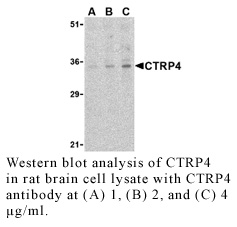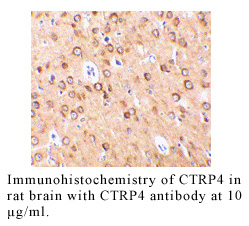Anti-Human CTRP4 (CT)
Data
- -
- -
Antibody DetailsProduct DetailsReactive Species Human Host Species Rabbit Immunogen PN:C1263 Product Concentration 0.5 mg/ml Formulation This polyclonal antibody is formulated in phosphate buffered saline (PBS) pH 7.4 containing 0.02% sodium azide as a preservative. Storage and Handling This polyclonal antibody is stable for at least one week when stored at 2-8°C. For long term storage, aliquot in working volumes without diluting and store at –20°C in a manual defrost freezer. Avoid Repeated Freeze Thaw Cycles. Country of Origin USA Shipping Next Day Ambient RRIDAB_2828388 Each investigator should determine their own optimal working dilution for specific applications. See directions on lot specific datasheets, as information may periodically change. DescriptionDescriptionSpecificity Rabbit Anti-Human CTRP4 recognizes an epitope near the C-terminus of Human, Mouse and Rat CTRP4. This polyclonal antibody was purified using affinity chromatography. Background Adipose tissue of an organism plays a major role in regulating physiologic and pathologic processes such as metabolism and immunity by producing and secreting a variety of bioactive molecules termed adipokines (reviewed in 1). One highly conserved family of adipokines is adiponectin/ACRP30 and its structural and functional paralogs, the C1q/tumor necrosis factor-related proteins (CTRPs) 1-7.2 Unlike adiponectin, which is expressed exclusively by differentiated adipocytes, the CTRPs are expressed in a wide variety of tissues.3 These proteins are thought to act mainly on liver and muscle tissue to control glucose and lipid metabolism. An analysis of the crystal structure of adiponectin revealed a structural and evolutionary link between TNF and C1q-containing proteins, suggesting that these proteins arose from a common ancestral innate immunity gene.4 Multiple isoforms of mouse CTRP4 have been reported. PubMed References & Citations1. Fantuzzi, G. (2005) J. Allergy Clin. Immunol. 115:911 2. Tsao, TS. et al. (2002) Euro. J. Pharmacol. 440:213 3. Wong, GW. et al. (2004) Proc. Natl. Acad. Sci. USA 101:10302 4. Shapiro, L. et al. (1998) Curr. Biol. 8:335 Technical ProtocolsCertificate of Analysis |
Related Products
- -
- -
Prod No. | Description |
|---|---|
C1244 | |
C1245 | |
C1263 | |
C1264 |




